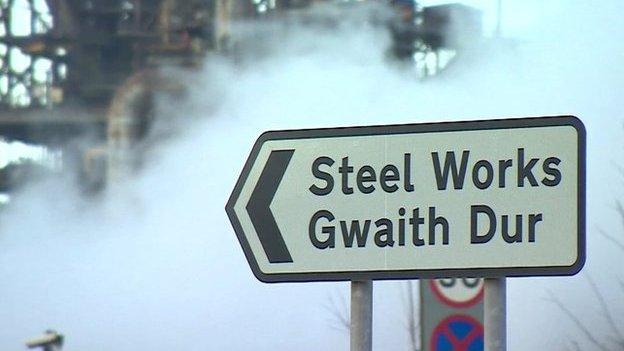PM 'not ruling anything out' (except nationalisation)
- Published
- comments

'The situation at Port Talbot is of deep concern' - David Cameron on the steel industry.
David Cameron has chaired a short meeting of ministers to discuss the steel industry. Among those present in Downing Street were the Business Minister Anna Soubry (whose boss has yet to arrive back from Australia), Work and Pensions Secretary Stephen Crabb and Welsh Secretary Alun Cairns.
The prime minister gave a short interview afterwards. This is what he said: "The situation at Port Talbot is of deep concern. I know how important those jobs are; those jobs are vital to workers' families, vital to those communities, and the government will do everything it can, working with the company to try and secure the future of steel-making in Port Talbot and across the country. It's a vital industry.
"We're not ruling anything out. I don't believe nationalisation is the right answer. What we want to do is secure a long-term future for Port Talbot and for other steel-making plants in the United Kingdom."
"This is an issue where I've had teams of ministers working for months to help this industry, to make sure that we procure British steel for our ships and for other vital industries in the UK.
'Closure'
"We've cut the energy costs of British steel and also with others in Europe we've made sure there's proper penalties for those who dump cheap steel on the market but this industry is in difficulty right across the world. There's been a collapse in prices, there's massive over-capacity but we're doing everything we can.
"We were concerned that there was the chance that there could have been an outright closure of Port Talbot and that is why we worked very hard with the company to make sure there is a proper sales process and we'll be doing everything we can to encourage people to come forward but this is a difficult situation, there's no guarantees of success."
"We have had a plan and we've been working to that plan because, as I've said, we've had teams of ministers working on procurement, working on cutting energy costs, working on making sure we act properly in Europe, making sure we work with the company and one of the things we were concerned about was there might have an announcement of an outright closure and actually our intervention I think has helped to make sure that there will at least be a sales process. Now we need to work very hard with the company, with the communities, with potential purchasers, recognising that the British government stands ready to do whatever it can to help in what is a very difficult situation.
'Dumping'
"And let me make this point about the European dimension of this. Look, it's vital that those European markets are open. Around 50 per cent of British steel production goes into the EU so we need to be in there working with others to stop the unfair dumping of steel into Europe by other countries, and we've done that, but we need to be in there making sure the markets are open. If we were on the outside, we might well find that it was our steel that was having those tariffs and those taxes put upon it.
"So, we've got the right plan, we're going to work very hard with the company to do everything we can, but it is a difficult situation, there are no guarantees of success because of the problems the steel industry faces worldwide. But the government will do everything it can to help, working with the company, working with the communities, to try to secure the future of this vital steel-making in Port Talbot and elsewhere in the UK."